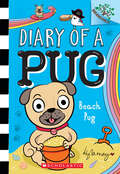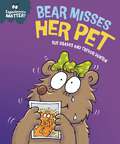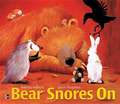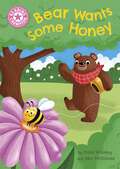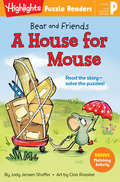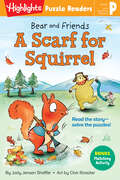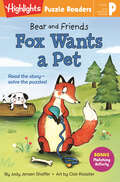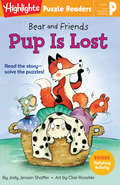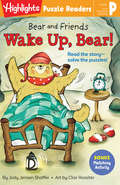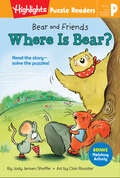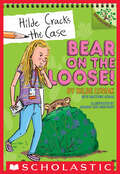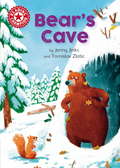- Table View
- List View
Beach Pug: A Branches Book (Diary of a Pug)
by Kyla MayThe tenth Branches early chapter book featuring the hilarious pug, Bub, and his human, Bella!Pick a book. Grow a Reader!This series is part of Scholastic's early chapter book line, Branches, aimed at newly independent readers. With easy-to-read text, high-interest content, fast-paced plots, and illustrations on every page, these books will boost reading confidence and stamina. Branches books help readers grow!Meet the cutest pug on the planet! Bella and Bub are at the beach with their friends Jack and Luna for a dog-surfing contest. But when Bub realizes the ocean is full of water, Bella’s plans to win crumble like sand. Then Bub finds a treasure map! Will finding the treasure save the trip from turning into a total wipeout?With full-color artwork throughout, this funny and charming diary-format early chapter book is perfect for anyone who believes a furry pal is the best kind of friend.
Beady Bear: With the Never-Before-Seen Story Beady's Pillow
by Don FreemanUpon its 1954 debut, the cuddly classic Beady Bear was praised by The New York Times as "the kind of book small children will delight in." Don Freeman, author of the acclaimed children's story Corduroy, recounts the whimsically illustrated tale of a wind-up toy who longs to live like a real bear. When Beady learns that bears are brave and live in caves, he resolves to give it a try - and discovers that being real is actually about loving and being loved.This longtime favorite is presented for the first time with its previously unpublished sequel, Beady's Pillow, another heartwarming charmer only recently discovered by the author's son. Beady's friend Thayer sets out to retrieve a pillow that the adventurous bear has lost, and when Thayer disappears into a cave and doesn't come out, Beady has a chance to prove his bravery.
Bean and the New Kitten (Fountas & Pinnell Classroom, Guided Reading)
by Sarah Brockett Janos JantnerNIMAC-sourced textbook
Bear Misses Her Pet (Experiences Matter #136)
by Sue GravesBear Misses Her Pet offers a gentle introduction to the experience of losing a pet for young children.This gentle, charming story is the perfect way to introduce young children to the experience of a pet dying. Also included are suggestions for activities and ideas to talk through together to help children reflect on their own experiences.Bear loves her hamster, Hammy. They are great friends. When Hammy no longer wants to play with her, Bear is very worried. And when Hammy dies, Bear is very upset. Dad helps Bear to find a way to remember Hammy in a positive way.The Experiences Matter series of picture books provide a gentle means of discussing experiences, boosting self-esteem and reinforcing good behaviour. Supports the Personal, Social and Emotional Development Area of Learning in the Early Years Foundation Stage, and is also suitable for use with children in KS1 and can be used to discuss values. Suitable for children under 5.
Bear Snores On (Elementary Core Reading Ser.)
by Karma Wilson Jane ChapmanNIMAC-sourced textbook <P><P>On a cold winter night many animals gather to party in the cave of a sleeping bear, who then awakes and protests that he has missed the food and the fun.
Bear Wants Some Honey: Independent Pink 1a (Reading Champion #516)
by Katie WoolleyThis story is part of Reading Champion, a series carefully linked to book bands to encourage independent reading skills, developed with Dr Sue Bodman and Glen Franklin of UCL Institute of Education (IOE)Bear has run out of honey, and he wants some more. When he spots a bee in the garden, he knows just what to do!Reading Champion offers independent reading books for children to practise and reinforce their developing reading skills.Fantastic, original stories are accompanied by engaging artwork and a reading activity. Each book has been carefully graded so that it can be matched to a child's reading ability, encouraging reading for pleasure. Perfect for 4-5 year olds or those reading book band pink 1a.
Bear and Friends: A House for Mouse (Highlights Puzzle Readers)
by Jody Jensen ShafferStories + Puzzles = Reading Success! Highlights Puzzle Readers offer an innovative approach to learning that integrates puzzles and stories to develop motivated, confident readers. These Level P books are perfect for kids just beginning to read simple sentences.Mouse is looking for a new house, but everything Bear and Squirrel suggest isn't quite right. In this Level P Highlights Puzzle Reader, readers can join in the search for a house for Mouse and then find hidden letters throughout the book. The simple text has lots of picture support that will keep readers turning the pages, while the puzzle encourages re-reading. With a bonus matching activity to reinforce vocabulary, kids will love playing along in this forest adventure.
Bear and Friends: A Scarf for Squirrel (Highlights Puzzle Readers)
by Jody Jensen ShafferHighlights Puzzle Readers offer an innovative approach to learning that integrates puzzles and stories to develop motivated, confident readers. These Level P books are perfect for kids learning to recognize letters and sounds.Bear and Mouse lost the scarf they want to give their friend, Squirrel. In this Level P Highlights Puzzle Reader, readers can join in the search for the scarf and then find hidden letters throughout the book. The simple text has lots of picture support that will keep readers turning the pages. With a bonus matching activity to reinforce vocabulary, kids will love playing along in this forest adventure.
Bear and Friends: Fox Wants a Pet (Highlights Puzzle Readers)
by Jody Jensen ShafferHighlights Puzzle Readers offer an innovative approach to learning that integrates puzzles and stories to develop motivated, confident readers. These Level P books are perfect for kids learning to recognize letters and sounds.Fox is looking for a pet, but everything Bear, Mouse, and Squirrel suggest isn't quite right. In this Level P Highlights Puzzle Reader, kids can join in the search and then find hidden letters throughout the book. The simple text has lots of picture support that will keep readers turning the pages. With a bonus matching activity to reinforce vocabulary, kids will love playing along in this forest adventure.
Bear and Friends: Pup Is Lost (Highlights Puzzle Readers)
by Jody Jensen ShafferHighlights Puzzle Readers offer an innovative approach to learning that integrates puzzles and stories to develop motivated, confident readers. These Level P books are perfect for kids just beginning to read simple sentences.Fox can't find his black-and-white puppy--where could Pup be? In this Level P Highlights Puzzle Reader, kids can join in the search and then find hidden letters throughout the book. The simple text has lots of picture support that will keep readers turning the pages. With a bonus matching activity to reinforce vocabulary, kids will love playing along in this forest adventure.
Bear and Friends: Wake Up, Bear! (Highlights Puzzle Readers)
by Jody Jensen ShafferHighlights Puzzle Readers offer an innovative approach to learning that integrates puzzles and stories to develop motivated, confident readers. These Level P books are perfect for kids just beginning to read simple sentences.Bear looks for Duck, his friend who visits each spring, but is Bear up too soon? In this Level P Highlights Puzzle Reader, kids can join in the search and then find hidden letters throughout the book. The simple text has lots of picture support that will keep readers turning the pages. With a bonus matching activity to reinforce vocabulary, kids will love playing along in this forest adventure.
Bear and Friends: Where Is Bear? (Highlights Puzzle Readers)
by Jody Jensen ShafferStories + Puzzles = Reading Success! Highlights Puzzle Readers offer an innovative approach to learning that integrates puzzles and stories to develop motivated, confident readers. These Level P books are perfect for kids just beginning to read simple sentences.Mouse and Squirrel can't find their friend, Bear. In this Level P Highlights Puzzle Reader, readers can join in the search for Bear and then find hidden letters throughout the book. The simple story text has lots of picture support that will keep readers turning the pages, while the puzzle encourages re-reading. With a bonus matching activity to reinforce vocabulary, kids will love playing along with this forest adventure.
Bear and the Cart (Fountas & Pinnell Classroom, Guided Reading)
by Jennifer Morris Jacqueline AdamsNIMAC-sourced textbook. Is Bear in Trouble? Rabbit thinks Bear is stuck in a runaway cart! Bear's friends run to help. But where is Bear?
Bear and the Little Snakes (Fountas & Pinnell Classroom, Guided Reading Kindergarten)
by Jennifer Morris Jacqueline AdamsNIMAC-sourced textbook
Bear and the Lost Snake (Fountas & Pinnell Classroom, Guided Reading)
by Jennifer Morris Jacqueline AdamsNIMAC-sourced textbook. Gone! Bear is babysitting three little snakes, but one little snake goes missing! What will Bear do?
Bear and the Monster (Fountas & Pinnell Classroom, Guided Reading)
by Jennifer Morris Jacqueline AdamsNIMAC-sourced textbook
Bear and the Puddle (Fountas & Pinnell Classroom, Guided Reading)
by Jennifer Morris Jacqueline AdamsNIMAC-sourced textbook
Bear on the Loose!: A Branches Book (Hilde Cracks the Case #2)
by Joanne Lew-Vriethoff Matthew Lysiak Hilde LysiakPick a book. Grow a Reader! This series is part of Scholastic's early chapter book line Branches, aimed at newly independent readers. With easy-to-read text, high-interest content, fast-paced plots, and illustrations on every page, these books will boost reading confidence and stamina. Branches books help readers grow! Nine-year-old crime reporter Hilde Lysiak is back for the second book in this early chapter book mystery series! This time, there's a bear on the loose in Selinsgrove! Hilde knows a BIG story when she hears one, and she's determined to get the scoop. So she and her sister/photographer, Izzy, set out to track the bear and find out where he came from. But how will they find the bear? And can Hilde crack this case before someone gets hurt? Joanne Lew-Vriethoff's personality-filled black-and-white illustrations appear on every page, bringing Hilde's adventures to life for young readers!
Bear's Cave: Independent Reading Red 2 (Reading Champion #378)
by Jenny JinksThis story is part of Reading Champion, a series carefully linked to book bands to encourage independent reading skills, developed with Dr Sue Bodman and Glen Franklin of UCL Institute of Education (IOE)It's freezing cold and bear wants to sleep, so he finds a nice empty cave to shelter in. But as he tries to rest, a number of animals interrupt him, wanting to escape the bitter cold. Bear is not happy and tells each of the animals to go away, but still he can't sleep. Then bear has an idea that will help him and all the animals ...Reading Champion offers independent reading books for children to practise and reinforce their developing reading skills.Fantastic, original stories are accompanied by engaging artwork and a reading activity. Each book has been carefully graded so that it can be matched to a child's reading ability, encouraging reading for pleasure. Perfect for the 4-5 year old beginner reader or those reading book band red.
Bear's Cookout (Fountas & Pinnell Classroom, Guided Reading)
by Jennifer Morris Jacqueline AdamsNIMAC-sourced textbook
Bear's Flowers (Fountas & Pinnell Classroom, Guided Reading)
by Jennifer Morris Jacqueline AdamsNIMAC-sourced textbook. Where Did the Flowers Go? Bear just wants to enjoy the flowers in his garden, but someone keeps eating them.
Bear's Itch (Fountas & Pinnell Classroom, Guided Reading)
by Barbara Dwier François RuyerNIMAC-sourced textbook
Bear's Nap (Fountas & Pinnell Classroom, Guided Reading Grade 1)
by Jennifer Morris Jacqueline AdamsNIMAC-sourced textbook
Bear's Paint Problem (Fountas & Pinnell Classroom, Guided Reading)
by Jennifer Morris Jacqueline AdamsNIMAC-sourced textbook. A Mix-Up. Bear leaves some paint cans by his gate. His friends think it's time to paint! What will Bear find when he comes back?
